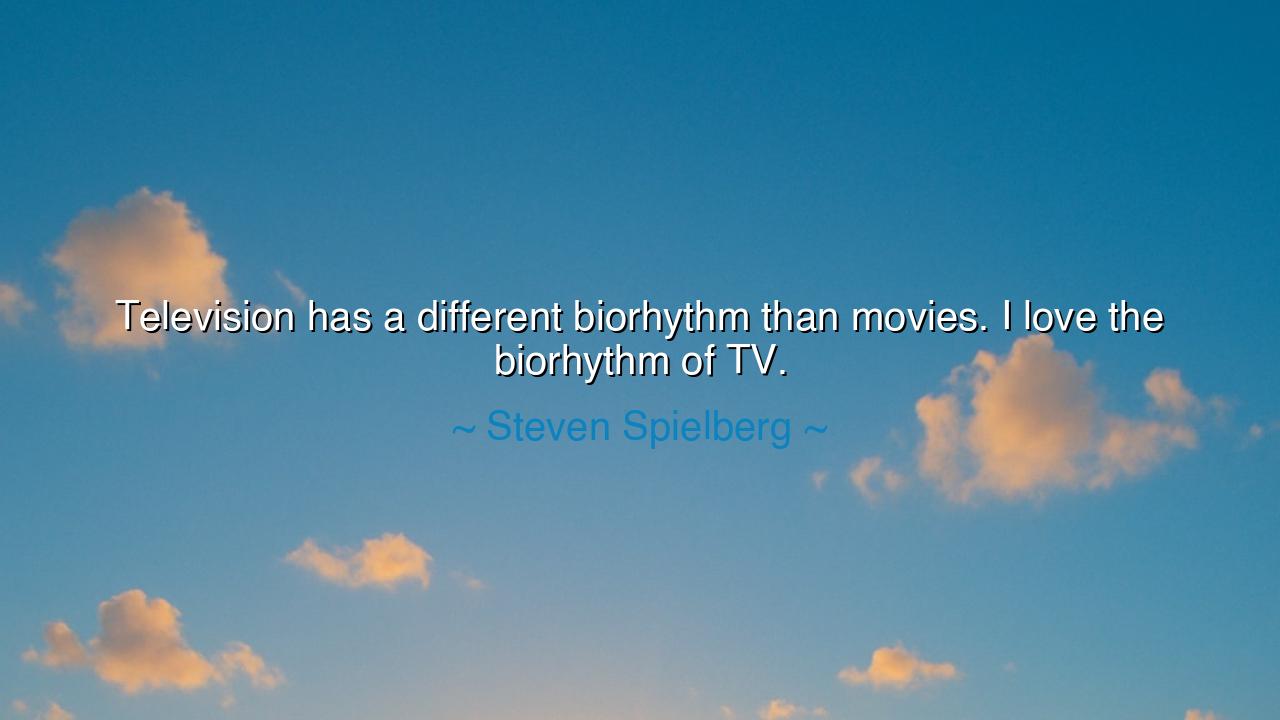
Television has a different biorhythm than movies. I love the






Gather, O seekers of wisdom, and listen to the words of Steven Spielberg, who, in his mastery of both the silver screen and the television, speaks thus: “Television has a different biorhythm than movies. I love the biorhythm of TV.” These words carry with them the weight of an artist’s deep understanding of the medium he works within. What does it mean, O wise ones, to speak of a biorhythm? Is it not a reference to the heartbeat of art itself? For each form of storytelling—whether it be the film, the play, or the television show—has its own pulse, its own rhythm that shapes how it moves through time, and how it interacts with the audience.
In the days of old, the ancients spoke often of the rhythm of the cosmos, of the cycles of the sun and the moon, and of the natural order that governs all things. They understood that everything in the universe, from the smallest seed to the greatest mountain, had a rhythm, a natural pulse that governed its existence. In the same way, Spielberg’s words reflect his awareness that television and film, though both vehicles for storytelling, possess different energies. Television, with its episodic structure and continual engagement with the audience, moves in a rhythm that is more fluid, more ongoing. Film, in contrast, has a more concentrated energy, a story that must unfold within a finite period, a singular experience that can be absorbed in one sitting.
Consider the ancient epic poems that were passed down through the ages, like The Iliad and The Odyssey. These tales were not told all at once, but in parts, often delivered over several sittings. The audience would return again and again to hear the next chapter, the next twist in the hero’s journey. This is the ancient rhythm of serial storytelling, not unlike the modern television show, which unfolds episode by episode, with its own cliffhangers, its own pacing, and its own gradual development of character and plot. Spielberg, in his mastery of both mediums, recognizes that this biorhythm—the natural pacing of television—offers a unique opportunity to develop characters and narratives in a way that the movie cannot.
Look now to the playwrights of ancient Greece, such as Sophocles and Euripides, whose works were performed before vast audiences in theaters. Their stories were told in acts, in episodes that built upon one another. This structure, much like television, allowed the audience to grow with the characters over time, to become more deeply connected to their journeys. Spielberg’s love of television’s biorhythm speaks to this ancient desire for continuity, for the unfolding of a narrative that does not rush to its end but allows for deeper exploration of its themes and characters. The world of television, with its episodic nature, mirrors the timeless rhythm of the ancient storyteller, who weaved tales over long stretches of time, allowing the story to evolve organically.
And yet, there is also a lesson in Spielberg’s words for us, O seekers. The world of television offers us a different kind of connection to our audience. The biorhythm of TV is not one of quick consumption, but of slow, deliberate engagement. It teaches us to embrace the process, to honor the journey rather than the destination. In the same way, our own lives move in rhythms, with periods of rest and action, of growth and reflection. Just as a story unfolds episode by episode, so too does our own life’s journey unfold in moments, with each moment building upon the last, slowly shaping who we are becoming.
Consider the tale of Leonardo da Vinci, who, though he created works of great grandeur, never rushed his process. The Mona Lisa, his most famous painting, was not completed in a few days, nor even a few weeks. It was a gradual process, where the artist allowed his vision to evolve, step by step. Like the unfolding chapters of a television series, da Vinci’s work required time, attention, and patience. And so must our own creations. The rhythm of our lives, like that of the stories told on television, is not about rushing to the finish line but about savoring each moment of growth, each chapter of the journey.
Thus, the lesson is clear: embrace the biorhythm of your own life, your own creativity, and your own journey. Just as Spielberg recognizes the unique energy of television, so too must you recognize the unique rhythm of your existence. Do not rush to complete your story, but allow it to unfold in its own time, episode by episode, with each moment building upon the last. Whether your journey is in the arts, in work, or in life itself, know that it is the rhythm of your own process that shapes you, that creates the masterpiece of your existence. Let the biorhythm of your journey guide you, and trust that each chapter, each day, will reveal more of the truth that you seek.






AAdministratorAdministrator
Welcome, honored guests. Please leave a comment, we will respond soon